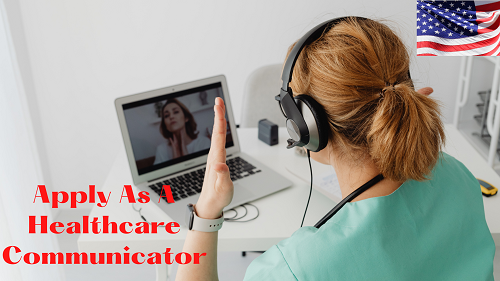Apply As A Healthcare Communicator (Hiring Now!)
Job description of a Healthcare Communicator
Job duties of a Healthcare Communicator may include:
- Developing and implementing health communication and marketing strategies.
- Writing and editing health-related materials such as brochures, websites, and newsletters.
- Organizing and conducting health education programs and workshops.
- Collaborating with healthcare providers and other stakeholders to design and implement health information campaigns.
- Monitoring and evaluating the impact of health communication programs.
- Keeping up-to-date with developments in the healthcare field, and incorporating new information into communication strategies.
- Responding to questions and inquiries about health information from patients, healthcare providers, and the general public.
- Working with healthcare providers and community organizations to promote healthy lifestyles and prevent disease.
A Healthcare Communicator typically has a background in health science, communication, or marketing, and is able to effectively communicate complex health information to a wide range of audiences. They may work in a variety of settings, including hospitals, health departments, non-profit organizations, and public health agencies.
Also check:
What do you need for this position?
- Education: A bachelor’s or master’s degree in health sciences, communication, marketing, or a related field is often required for this position.
- Knowledge: Knowledge of health sciences and healthcare systems is important, as well as an understanding of health communication principles and techniques.
- Writing and Communication Skills: The ability to write clear and concise health information, and to communicate effectively with a wide range of stakeholders, is essential.
- Creativity: The ability to develop innovative health communication campaigns and programs is important, as well as the ability to adapt to changing healthcare trends and needs.
- Interpersonal Skills: The ability to work effectively with healthcare providers, patients, and community organizations is important, as well as the ability to build and maintain positive relationships.
- Project Management Skills: The ability to plan and manage health communication programs, and to coordinate the work of others, is important.
- Technology Skills: Familiarity with digital marketing and communication tools and platforms, such as social media, is important in this position.
- Attention to Detail: The ability to accurately review and edit health information is important, as well as the ability to identify and correct errors.
- Adaptability: The ability to adapt to changing healthcare trends and needs, and to stay up-to-date with the latest developments in the field, is important.
What makes a good communicator in healthcare?
A good Healthcare Communicator possesses several key qualities that allow them to effectively communicate complex health information to a wide range of stakeholders:
- Clarity: A good Healthcare Communicator is able to communicate complex health information in a clear and concise manner, making it easy for patients, healthcare providers, and the general public to understand.
- Empathy: A good Healthcare Communicator is able to understand the perspectives and needs of different stakeholders, and to tailor their communication accordingly.
- Active Listening: A good Healthcare Communicator is able to listen actively to others, and to respond to questions and concerns in a thoughtful and compassionate manner.
- Cultural Competence: A good Healthcare Communicator is able to communicate effectively with people from diverse cultural and linguistic backgrounds, and to take into account cultural differences when developing health information campaigns.
- Knowledge: A good Healthcare Communicator has a deep understanding of health sciences and healthcare systems, and is able to effectively communicate complex health information to a wide range of audiences.
- Adaptability: A good Healthcare Communicator is able to adapt to changing healthcare trends and needs, and to stay up-to-date with the latest developments in the field.
- Creativity: A good Healthcare Communicator is able to develop innovative health communication campaigns and programs that engage and inform a wide range of stakeholders.
- Professionalism: A good Healthcare Communicator is ethical, reliable, and professional in their work, and is able to build and maintain positive relationships with patients, healthcare providers, and other stakeholders.




